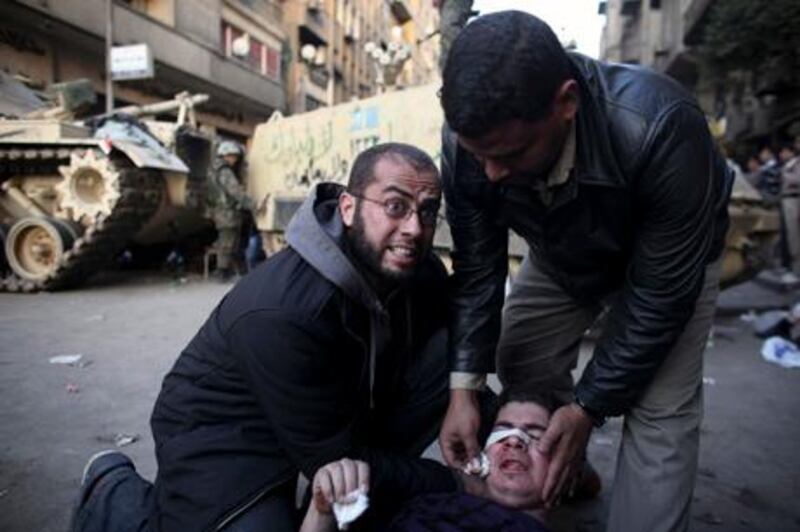CAIRO // Even before the recent flurry of attacks on anti-government protestors and journalists by supporters of President Hosni Mubarak, Heba Morayef found it challenging to work as a human rights investigator in her native Egypt.
Independent rights-monitoring organisations here have long struggled to document alleged abuses committed by the Egyptian government. The regime's pervasive security and intelligence apparatus is thought to pay particular attention to rights workers and any Egyptian who comes in contact with them.
Out of fear of retaliation by the authorities, she and other investigators have always operated cautiously.
“In general, working in Egypt as a human rights worker - well, you never would identify yourself as working in a human rights organisation,” Ms Morayef says.
“Generally, you would say things like, ‘Oh, hello, I’m researching and doing this thing or that thing.’”
But that started to change on January 25, says Ms Morayef, who works for the New York-based Human Rights Watch and has monitored and investigated rights abuses in Egypt since 2003.
The mass anti-government protests that erupted nearly two weeks ago have shaken the foundations of Mr Mubarak’s hold on power and with it, the grip of his regime’s dreaded security services has weakened. For Ms Morayef, the change has been dramatic.
“For the first time, inside the Tahrir Square, I’ve been able to say to people, ‘Hello, I work for an international human rights organisation’,” she says. “And then they say, ‘You have to tell the world this’.”
“That,” she believes, “fits in with the overall breaking of the wall of fear.”
While crumbling, however, the fear has far from disappeared.
Anti-foreigner paranoia is rife in Cairo’s streets, where gangs of pro-Mubarak loyalists have assaulted anti-government protesters, journalists and rights workers. Uniformed policemen working alongside plainclothes toughs carrying guns and kitchen knives have set up a labyrinth of checkpoints, where beatings and detentions are common.
Moreover, hundreds of protesters are believed to have been caught in sweeps carried out by the police and security forces.
Amid such turmoil and confusion, collecting information about abuses by the government and security forces requires bravery and street savvy.
While returning from a Cairo hospital where she was collecting data on casualties, Ms Morayef was searched by soldiers at a military checkpoint. In her bag were pamphlets distributed by protesters that contained unflattering portrayals of Mr Mubarak, as well as a notebook containing notes from her interviews of doctors.
But playing dumb, she was allowed to pass - at least until a woman from a fourth-floor apartment shouted. “She yelled down that I had something in my back pocket, and the military man called me back.”
The soldiers searched her more thoroughly and found the anti-Mubarak pamphlets. She succeeded, however, in persuading them to let her through.
Perhaps the hardest places to operate are hospitals and clinics, Ms Morayef says. Security agents have converged on medical facilities to await wounded protesters seeking treatment.
“They have security officials sitting at the entrance, taking down the details of all the injured protestors who are coming in,” she says. “There’s pressure to downplay fatalities at hospitals, so people were really reluctant to speak with me.”
Yet, from a few patients and sympathetic doctors, the details she gathered paint a disturbing picture. One physician told her of four patients he had examined who appeared to have been shot in the head at point-blank range, and others describe victims sustaining gunshot wounds apparently inflicted by sniper fire.
In the past few days, Ms Morayef’s concerns have centred more on the military, which has taken control of swaths of central Cairo and has been rounding up protesters and anyone else they deem suspicious.
On Thursday, more than 30 Egyptian and foreign rights activists were rounded up in the capital by men in civilian clothes. Egyptian authorities did not provide foreign embassies with detais about where their citizens were held or why they were arrested. Nevertheless, suspicion has fallen on the military as the responsible party. While releasing the foreign nationals on Friday, their Egyptian colleagues remain in detention.
Ms Morayef has few doubts about who is responsible for the detentions. “The military is solidly in charge and the regime is very capable of cracking down. The arrest spree over the past few days is by the military, and for people who think we’re going to have it better if [former intelligence chief and newly appointed vice-president] Omar Suleiman is in charge, that isn’t going to happen unless there are proper checks and balances to the military’s power,” she says.
Without such restraints, she predicts, “We’re going to be in for a very nasty period.”





